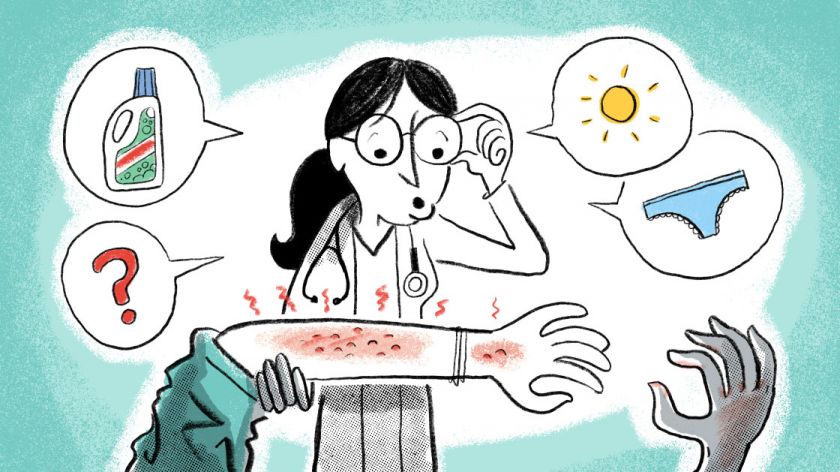Scabies often not easily recognised by GP: ‘The itching kept me awake most nights’
-
 Illustratie: Roel Venderbosch
Illustratie: Roel Venderbosch
Scabies has been making the rounds among students in Nijmegen. Because it resembles a lot of other skin conditions, general practitioners often have difficulty making the correct diagnosis. ‘My doctor thought the rash was caused by my underwear, but in the end it turned out to be scabies.’
Many a student has already suffered the affliction and can no longer stand to hear about it, while others are deathly afraid to catch it: scabies. Nijmegen is currently a hotbed for the skin condition, alongside fellow student-heavy cities Amsterdam and Groningen. In practice, the condition is difficult to recognise at first glance, according to students.
Scabies is a contagious skin condition that can be transmitted through direct skin contact, or by borrowing clothes or sitting on the sofa of an infected person. Students are especially susceptible to the mite, because they often live under the same roof with multiple people, and are also often in contact with their peers.

The skin condition is caused by the scabies mite, which tunnels under the skin. The body’s immune response to those tunnels is what causes bumps and itching. One major issue with treatment of the disease is that is not often recognised at first glance.
Bumps on buttocks
This was the case for business administration student Carlo* (22). When he first felt bumps on his buttocks and upper legs, he called his general practitioner (GP), who told him to buy different underwear. ‘But that didn’t help; the itching became unbearable.’
‘We kept infecting each other’
He didn’t find out the true cause until his girlfriend at the time also developed an itch. Her doctor told her that she had scabies. ‘There’s a good chance that she got it from me, of course’, Carlo says.
The economy student and his former girlfriend were both treated for scabies. They were advised to sleep apart for at least a few weeks after treatment. ‘But that’s easier said than done’, according to Carlo. ‘There was a kind of Ping-Pong effect: we kept infecting each other.’
When law student Joep* (22) reported an itch, his doctor initially came up with a different diagnosis. The student was prescribed a salve to help dry skin, but that didn’t take care of the itch. ‘I had a lot of sleepless nights at first. Then I looked into possible causes myself, and eventually I found out that it might be scabies. The doctor thought that unlikely, but gave me the treatment anyway; I still go to the doctor in my hometown, who rarely has to deal with scabies. After several treatments, I’m finally rid of it.’
Treatment issues
The many different treatments administered to students all come with a hefty price tag: Until December 2022, pills for treating scabies were not covered by health insurance, and those pills often cost around 60 euros. Fortunately, there have been some changes since, and now the treatment is covered.
However, there is currently a different issue with the treatment: the pills are hard to get. According to the team leader of the Radboudumc pharmacy, there are supply chain issues. ‘We have two suppliers, and both have announced longer delivery times. We can only hope that the delivery dates won’t be set back even further.’
Dermatologist
Rinke Borgonjen, a dermatologist at the Maurits clinic in Nijmegen, has noticed a steep rise in the number of scabies cases in the past few months. ‘I used to have one or two patients with scabies a month, but now telling people they have scabies has become a daily occurrence.’ Microbiologist Matthew McCall at Radboudumc earlier called for a coordinated approach in tackling the condition.
But why is the skin condition more easily recognised by a dermatologist than by a GP? Dermatologists often use something called a dermatoscope, an illuminated magnifying glass for the skin. General practitioners don’t always have such an instrument available whenever people come in to discuss bumps or itching. Borgonjen: ‘I am currently working on a course specifically dealing with scabies. The aim is to have the condition recognised by GP’s on the first pass.’
‘In our house, we barely mention it anymore if we have scabies’
Physical therapy student Maria* (22) also went to several doctors. On her first visit, she was told to switch laundry detergent. ‘But in the end, it turned out to be scabies’, Maria says.
In the end, Maria had to do three treatments (one treatment means completely covering the whole body twice, ed.) before she was finally rid of the mite. ‘One doctor studied my skin with a magnifying glass, while the other didn’t. That meant that I would get a new scabies treatment without a proper diagnosis; it felt more like a wild guess.’
Approach
Are the three students afraid of scabies? Carlo, at least, is not bothered. ‘In our house, we barely mention it anymore if we have scabies, because it’s become so normalised. Sometimes I’ll walk into a housemate’s room and see a bunch of bags sitting there, and think ‘Ah, it’s that time again, the scabies is back.’’
However, dermatologist Borgonjen emphasises that careful treatment is very important. ‘Along with special courses, education, and alertness, that really is the best approach. Student- and study associations could give more attention to it on a national level, in part to alleviate the sense of shame and insecurity.’
*Students’ names have been changed at their request, due to shame of the subject matter; their real names are known to the editors.
This article was translated by Jasper Pesch



